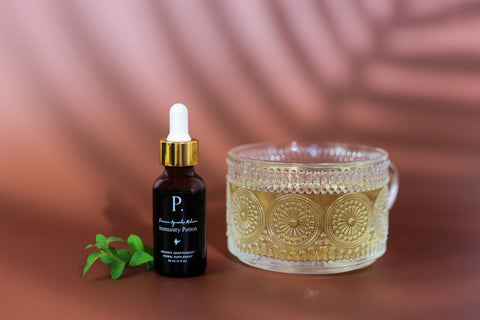Where do you get your daily vitamins?
Many of us have a cabinet devoted to pill bottles and rely on their multivitamins to get them the nutrients they need. The market is flooded with an array of manmade supplements marketed as the ultimate solution for immune support. The question is - do these pills actually provide the best benefits, or are they just a shadow of what a quality diet can provide?
Now, don’t get us wrong, it’s not necessarily a bad thing to take extra vitamins on the side, especially when you have a specific deficiency or your immune system needs extra fortification. However, if you can choose between synthetic pills and organic whole-food supplements, your body and immunity definitely have a preference.
Whole Foods vs. Synthetic Vitamins
Whole foods are a complex matrix of vitamins, minerals, antioxidants, and phytonutrients that work synergistically to enrich your body with good health. When nutrients are consumed in their natural form, your body absorbs them like a sponge, sending them everywhere they need to go to work the most efficiently. This is referred to as bioavailability, which involves the body effectively absorbing nutrients as well as using and storing them [1].
Take our daily Immunity Potion for instance.
Crafted from organic whole food ingredients such as turmeric, giloy, and echinacea, this formulation not only provides a concentrated dose of vitamins and minerals (such as iron, potassium, fiber, protein, vitamin A, E, K, C, B, and many more), but is also a plethora of compounds that support immune function. From helping balance hormones to fighting off free radicals with powerful antioxidants, each ingredient is brewed to perfection to create a natural approach to immune support.

On the other hand, synthetic supplements - although convenient - usually fall short in comparison to their whole food counterparts. Often derived from isolated compounds produced in laboratories, synthetic vitamins mimic natural vitamins and lack the complex array of co-factors (non-protein chemicals that support biochemical reactions) found in whole foods.
Absorption by the body is typically compromised, resulting in less health benefits. The bioavailability of vitamins is heavily reliant on food composition, and while vitamin toxicity is uncommon, when it does occur it is through synthetic sources [2].
3 Reasons to Avoid Synthetic Vitamins
-
Harder to Absorb
Your body has a hard time absorbing synthetic vitamins because they lack trace minerals, enzymes, and co-factors. This makes them less effective and leaves your nutrition levels lacking. Your body is also less likely to recognize a synthetic vitamin compared to its natural form.
-
Build Up of Toxins
Synthetic supplements hold high dosages of nutrients, which can sometimes pose health risks since excessive vitamin buildup can be toxic. Not to mention, the plastic coatings often found on pills may contribute to health problems.
-
Lack of Regulation
Although this is not the case for every product, sometimes a lack of regulation can result in recalls, false claims, and unsafe supplements circulating in the market. One 2017 study shed some light on commercial FDA products that were recalled for safety reasons [3].
3 Benefits of Whole Food Supplements
-
Synergistic Nutrients
Natural whole food supplements are chock-full of vitamins, minerals, and bioactive compounds that are synergetic with each other. this means that they support each other and support bodily functions.
-
Better Absorption
As we’ve mentioned before, the body absorbs vitamins best through their natural form. Eating a balanced diet and using whole-food supplements will provide you with essential nutrients that are easily absorbed for the best health and immunity.
-
Less Risks and Side Effects
One of the best parts about organic whole foods is that there are NO chemicals or additives that harm your health. Preserve your health without adding preservatives - get a list of ingredients to avoid for a better diet.
How Does Your Body Absorb Vitamins and Supplements?
The body tends to absorb certain vitamins more effectively when they are in their natural, whole food form due to the diverse nutrients and enzymes present.
Fun fact - certain enzymes and nutrients found in whole foods support the absorption of other vitamins. For instance, a study through the Steacie Institute for Molecular Sciences shows that organic vitamin E holds double the availability compared to its synthetic counterpart [4]. Thus, the body absorbs a natural source of vitamin E much more readily than synthetic forms.
Another example of where your body can run into absorption issues involves synthetic folic acid, often recommended to pregnant women through prenatal vitamins.
While folic acid is important, at least 50% of the population carry a gene mutation for a gene known as MTHFR. This gene produces an enzyme crucial for converting folic acid into its active form. The MTHFR mutation impacts the body's ability to convert synthetic folic acid, so individuals with the mutation may not effectively be able to absorb the folic acid found in most prenatal supplements [5].
🌿🌿🌿
Our potently dosed ingredients are made from organic, whole-food products that naturally support your immunity while providing vital nutrients that your body craves.
There is nothing synthetic about our certified organic Immunity Potion - we use only the best herbs and spices that can be added to your daily nutrition for long-term health.








